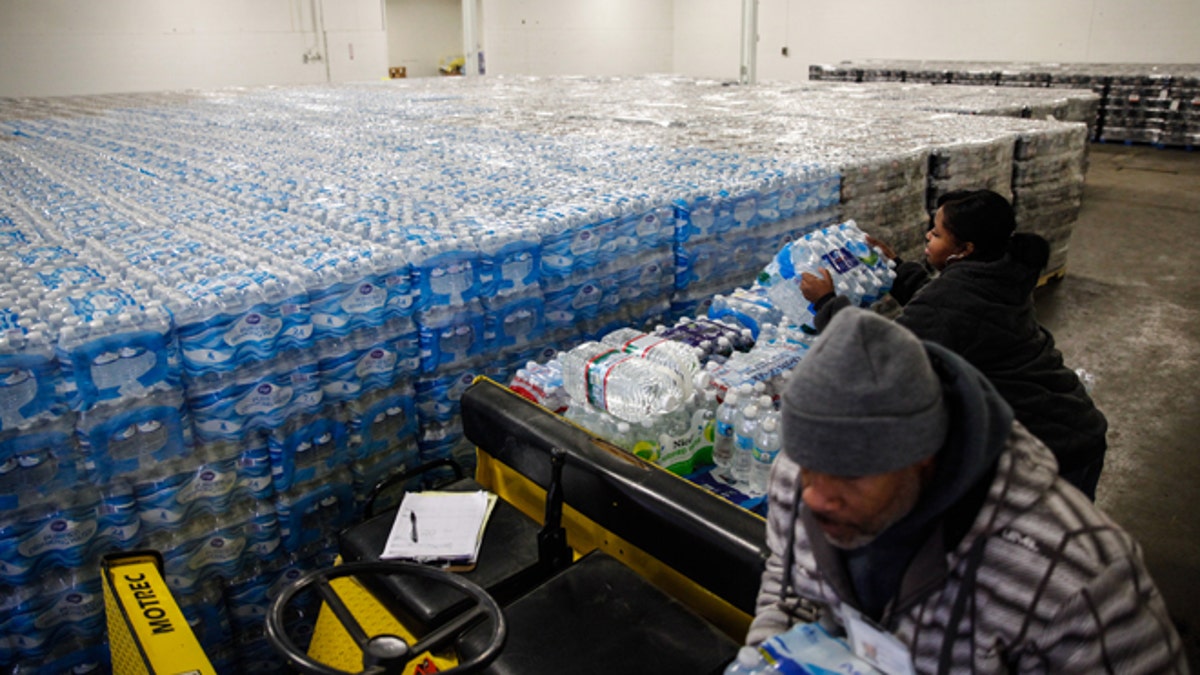
FLINT, MI - JANUARY 21: Pallets of bottled water are seen ready for distribution in a warehouse January 21, 2016 in Flint, Michigan. The warehouse is the emergency water supply for Flint residents affected by lead-contaminated water. (Photo by Sarah Rice/Getty Images) (2016 Getty Images)
Undocumented immigrants in Flint, Michigan, say they are too afraid to go to water distribution centers, and many say they were even unaware that there was a water crisis.
Father Zachary Mabee of St. Mary’s Catholic Church in Flint told Fox News Latino, “We are getting requests from people for water and water filters. We’re making it known that the church has water and filters, and we want people who’re undocumented to know if they’re scared, they can come here.”
There are about 1,000 undocumented immigrants living in Flint, most of them living on the east side of town.
One woman told local television station WJRT that she was too afraid to go to the water distribution centers dotting the city after a worker at one of them asked her for a driver’s license.
“I’m not here legally," she explained. "And I’m always scared that they'll arrest me, and then deport me."
The woman, a Mexican immigrant who only speaks Spanish, said for weeks she wasn’t even aware about the lead traces found in the drinking water because notices handed out to residents were only in English.
As panic spread through Flint, which switched its water supply in April 2014 in an effort to save money, many immigrants were left in the dark.
On Friday, an advisory panel to Michigan Gov. Rick Snyder recommended steps the state should take to restore reliable drinking water to the city, including hiring an unbiased third-party to declare when the water supply is free of lead.
The recommendations came a day after the U.S. Environmental Protection Agency told the state and city that their efforts to date had failed. The agency ordered them to protect public health and act to ensure Flint's water system is made safe.
Churches have doubled as distribution centers to many immigrants in the East Side, because they are the only places people are comfortable going without fear of deportation.
Many undocumented immigrants haven't been opening their doors to volunteers who have been going house-to-house to try and offer help because, activists say, many are afraid of answering their doors – possibly because of U.S. Immigration and Customs Enforcement raids of undocumented families that were conducted earlier this month.
“It wouldn’t surprise me that folks here would be cautious because of raids," Father Mabee said. "I would expect that to be their reaction.”
Deacon Paul Donnelly of St. Mary's told WJRT that many of the immigrants in the community only found out about the water contamination in the last week or two and only because “they’ve heard about the lead from family members who live far away.”
Some of the immigrants too scared to go to distribution centers are instead purchasing bottled water for bathing, cooking and drinking, which can be expensive. Other immigrants, because of language barriers, may still be unaware of the lead in the water supply.
“We’re meeting with the Hispanic Technology and Community Center and the Mexican-American Council this weekend on ways to better reach out to this undocumented community and help them. But it can be tricky,” Father Mabee said.
The one thing most vital on the minds of this local community, Father Mabee said, is that they want a healthy place to live – for themselves and especially for their children.
The Associated Press contributed to this report.








































